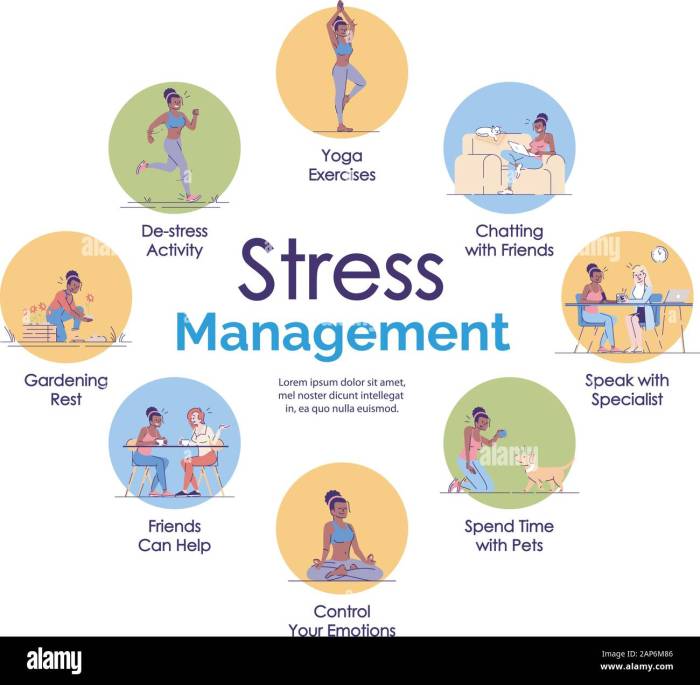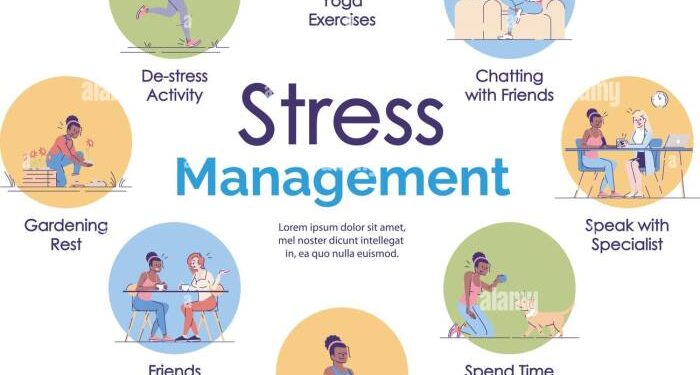Chronic stress management strategies that work sets the stage for this enthralling narrative, offering readers a glimpse into a story that is rich in detail and brimming with originality. As we delve into the realm of effective chronic stress management, a world of possibilities unfolds to help individuals navigate the complexities of stress in their daily lives.
Understanding the nuances of chronic stress and exploring proven strategies that yield positive results pave the way for a transformative journey towards improved well-being and mental clarity.
Overview of Chronic Stress
Chronic stress is a prolonged state of stress that can have a significant impact on both mental and physical health. Unlike acute stress, which is short-term and often results from specific situations, chronic stress persists over an extended period and can stem from various sources in daily life.
Impact on Mental and Physical Health
Chronic stress can lead to a variety of health issues, including anxiety, depression, high blood pressure, heart disease, and weakened immune function. The continuous activation of the body's stress response can take a toll on overall well-being and quality of life.
Difference Between Acute and Chronic Stress
Acute stress is a temporary response to a particular stressor, such as a work deadline or a traffic jam, and typically subsides once the situation is resolved. On the other hand, chronic stress persists over a prolonged period and can result from ongoing issues like financial problems, relationship conflicts, or work-related stress.
Common Sources of Chronic Stress
- Work-related pressure and deadlines
- Financial difficulties and insecurity
- Relationship conflicts and family issues
- Chronic health conditions or caregiving responsibilities
- Traumatic events or ongoing life challenges
Importance of Managing Chronic Stress
Chronic stress is a serious issue that can have detrimental effects on both physical and mental health. It is crucial to effectively manage chronic stress to prevent long-term consequences and maintain overall well-being.Experiencing unmanaged chronic stress can lead to a variety of health problems, including high blood pressure, heart disease, obesity, and depression.
Prolonged exposure to stress hormones can weaken the immune system, making individuals more susceptible to illnesses and diseases.Research has shown that chronic stress is prevalent in society, with a significant portion of the population reporting high levels of stress on a regular basis.
According to the American Institute of Stress, 77% of people in the United States regularly experience physical symptoms caused by stress, while 73% experience psychological symptoms.
Impact on Physical Health
Chronic stress can have a profound impact on physical health, increasing the risk of developing various conditions such as cardiovascular disease, diabetes, and gastrointestinal issues. The constant release of stress hormones can lead to inflammation in the body, contributing to the development of chronic illnesses over time.
- Chronic stress can weaken the immune system, making individuals more susceptible to infections and illnesses.
- Long-term stress can affect sleep patterns, leading to insomnia and other sleep disorders.
- Stress-related muscle tension and pain can manifest in conditions such as tension headaches, migraines, and chronic pain syndromes.
Impact on Mental Health
In addition to physical health concerns, chronic stress can also have a significant impact on mental well-being. Persistent stress can contribute to the development of anxiety disorders, depression, and other mental health conditions.
- Chronic stress can impair cognitive function, affecting memory, concentration, and decision-making abilities.
- Prolonged stress can exacerbate existing mental health issues and lead to the onset of new disorders.
- Stress-related emotional symptoms may include irritability, mood swings, and feelings of overwhelm or hopelessness.
Effective Strategies for Managing Chronic Stress

Chronic stress can have a significant impact on our overall well-being, but there are effective strategies that can help in managing and reducing stress levels. These strategies not only promote mental and emotional health but also contribute to better physical health outcomes.
1. Mindfulness Meditation
Mindfulness meditation involves focusing on the present moment without judgment. This practice can help individuals become more aware of their thoughts and feelings, leading to a greater sense of calm and clarity. By incorporating mindfulness meditation into daily routines, individuals can reduce stress levels and improve overall mental well-being.
2. Exercise and Physical Activity
Engaging in regular physical activity releases endorphins, which are known as "feel-good" hormones. Exercise helps to reduce stress, anxiety, and depression while improving mood and overall cognitive function. Whether it's going for a run, practicing yoga, or taking a dance class, finding an enjoyable physical activity can significantly reduce chronic stress levels.
3. Healthy Lifestyle Habits
Adopting healthy lifestyle habits such as maintaining a balanced diet, getting an adequate amount of sleep, and limiting caffeine and alcohol intake can play a crucial role in managing chronic stress. A healthy lifestyle supports overall well-being and strengthens the body's ability to cope with stressors effectively.
4. Social Support and Connection
Building and maintaining strong social connections can provide a sense of belonging and support during challenging times. Talking to friends, family members, or a therapist can help individuals navigate stressors and gain perspective on their experiences. Social support is essential in managing chronic stress and promoting resilience
Mindfulness and Meditation
Mindfulness and meditation are powerful tools for managing chronic stress. By incorporating these practices into your daily routine, you can learn to better cope with stressors and improve your overall well-being.
Role of Mindfulness and Meditation
- Mindfulness involves being fully present in the moment, without judgment or reaction to thoughts or feelings. This practice can help individuals become more aware of their stress triggers and learn to respond to them in a calm and collected manner.
- Meditation, on the other hand, focuses on quieting the mind and promoting relaxation. By incorporating meditation into your routine, you can reduce the negative effects of chronic stress on both your mind and body.
Techniques for Mindfulness and Meditation
- Start with deep breathing exercises to help center yourself and calm your mind. Focus on your breath as you inhale and exhale slowly.
- Practice body scan meditation, where you focus on each part of your body and release tension as you move through each body part.
- Engage in guided meditation sessions, either through apps or online resources, to help guide you through the practice and keep you focused.
- Set aside time each day for mindfulness practices, whether it's a few minutes of deep breathing or a longer meditation session. Consistency is key in reaping the benefits of these practices.
Physical Exercise and Stress Relief
Regular physical exercise is a powerful tool in managing chronic stress. Exercise has been shown to reduce levels of the body's stress hormones, such as adrenaline and cortisol, while simultaneously releasing endorphins, which are natural mood lifters.
Types of Effective Exercises
- Cardiovascular Exercise: Activities like running, cycling, or swimming can help increase the production of endorphins, improving mood and reducing stress levels.
- Strength Training: Engaging in weightlifting or bodyweight exercises can help build physical resilience to stress and boost self-esteem.
- Yoga: Combining physical movement with mindfulness, yoga can help relax the body and mind, reducing stress and anxiety.
- Pilates: This low-impact exercise focuses on core strength, flexibility, and mind-body connection, promoting relaxation and stress relief.
Healthy Lifestyle Choices
Healthy lifestyle choices play a crucial role in managing chronic stress effectively. By focusing on nutrition, sleep, and self-care, individuals can significantly reduce stress levels and improve overall well-being.
The Impact of Nutrition on Stress Levels
Nutrition plays a key role in managing stress levels. Consuming a balanced diet rich in fruits, vegetables, whole grains, and lean proteins can provide the necessary nutrients to support the body during stressful times. Avoiding excessive caffeine, sugar, and processed foods can also help in reducing stress.
The Importance of Quality Sleep
Sleep is essential for stress management as it allows the body to rest and rejuvenate. Establishing a regular sleep schedule, creating a calming bedtime routine, and ensuring a comfortable sleep environment can promote better sleep quality and reduce stress levels.
The Role of Self-Care in Stress Reduction
Self-care practices such as mindfulness, relaxation techniques, and engaging in hobbies can help individuals cope with stress more effectively. Taking time for oneself, setting boundaries, and prioritizing self-care activities are essential in managing chronic stress.
Social Support and Connection
Building strong social connections and seeking social support are crucial in coping with chronic stress. These connections can provide a sense of belonging, reduce feelings of isolation, and offer comfort during challenging times.
Role of Social Support
Social support plays a significant role in helping individuals manage chronic stress. It involves having a network of family, friends, or peers who offer emotional, practical, or informational assistance when needed. This support can help individuals feel understood, cared for, and less alone in their struggles.
Benefits of Strong Social Connections
- Reduced feelings of isolation and loneliness
- Increased sense of belonging and connection
- Enhanced emotional well-being and resilience
- Improved self-esteem and confidence
Strategies for Fostering Supportive Relationships
- Initiate open and honest communication with loved ones
- Participate in group activities or support groups
- Express gratitude and appreciation for the support received
- Set boundaries and communicate your needs effectively
Seeking Help When Needed
It is important to recognize when you need help and reach out to your support system or mental health professionals. Seeking help is a sign of strength, not weakness, and can lead to better management of chronic stress in the long run.
Closure
In conclusion, chronic stress management strategies that work not only empower individuals to take charge of their stress levels but also open doors to a more balanced and fulfilling life. By implementing these strategies into daily routines, one can embark on a path towards resilience, peace, and overall wellness.
User Queries
How do mindfulness and meditation help in managing chronic stress?
Mindfulness and meditation techniques promote present-moment awareness and relaxation, enabling individuals to cope with stressors more effectively.
What are some examples of healthy lifestyle choices for stress management?
Incorporating nutritious diet, quality sleep, and regular self-care practices can significantly impact stress levels positively.
Why is social support important in coping with chronic stress?
Strong social connections provide emotional support, reduce feelings of stress and anxiety, and foster a sense of belonging and understanding.















